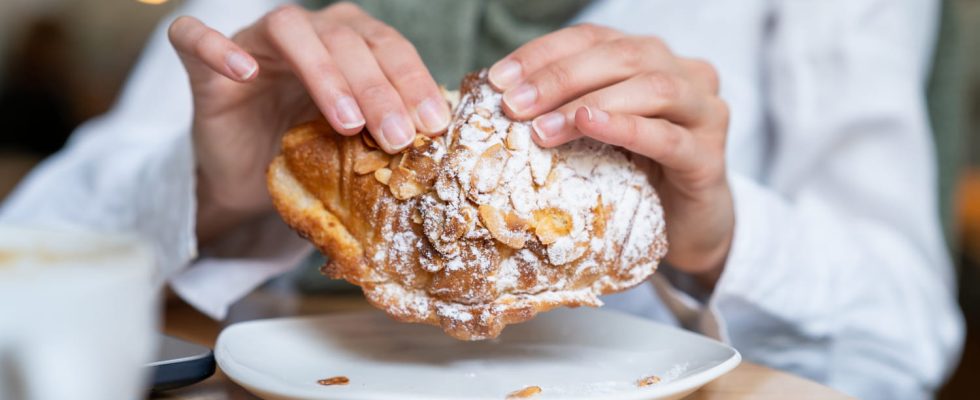In the morning, after meals, at night… Is your sugar (glucose) level much too high? Blood sugar spikes must be avoided because they affect sleep, energy, weight gain, skin… Warning symptoms and advice to avoid blood sugar spikes.
THE blood glucose (sugar) levels is called “blood sugar”. This concentration mainly depends on diet and physical activity of each and varies during the day. His brutal rise in blood or “blood sugar spike“activates insulin whose role is to pass sugar through the body to meet the body’s energy needs. Regulating sugar levels is necessary for maintaining good health. Blood sugar spikes cause many health problems (weight gain, poor sleep, heart problems, etc.). Why should blood sugar spikes be avoided? how the avoid after meals ? There night ? THE Morning ? During pregnancy ? Is it possible to have a blood sugar spike with an empty stomach ?
Definition: what is a spike in blood sugar?
After a meal, and especially when it is high in carbohydrates, the concentration of glucose (sugar) in the blood (glycaemia) increases, this is the blood sugar peak. “The organism then stimulates the pancreas so that he produce a hormone, insulinwhose role is to transport sugar from the blood to the cells to produce energy“, explains Dr. Alexandra Dalu, nutritionist. “At the end of a meal, the blood sugar level lasts more or less long depending on your age, your physical and intellectual activity until the next physiological hunger, the next meal and the new blood sugar peak” she clarifies.
What symptoms when blood sugar is too high?
THE digestive glands need rest outside of digestion periods. When the body experiences spikes in blood sugar levels too often, it causes “I’exhaustion” insulin which no longer manages to pass sugar into the cells and then remains in the blood. Imbalances in the glycemic curve can cause:
- irritability
- sleep disorders
- trouble concentrating
- tiredness
- eyesight problems
- skin problems (acne, psoriasis, eczema)
- high blood pressure
- kidney failure
- higher risk of stroke
- urinary tract infections
- fat storage (food cravings and snacking)
- an increased risk of depression
“Furthermore, bacteria ‘love’ sugar, so repeated spikes in blood sugar increase the risk infections“adds Dr. Dalu.
To avoid a spike in blood sugar after a meal, you simply must not (re)eat sugar, or else not eat it alone. “We do not banish sugar from the diet. However, avoid all types of sugar outside of a meal (even a fruit). When the body ingests sugar alone, there is a strong spike in blood sugar followed by a drop in blood sugar. The sugar should must be mixed with the food bolus so that he is surrounded by fibre, protein and fat. This allows the digestion of sugar to continue. Your blood sugar will be stable for hours after your meal“develops our expert.
► For the meal, “favor raw vegetables as a starter, a dish made up of proteins, starchy foods and vegetables and a little sugar for dessert” recommends Dr. Dalu.
► It is better to eat a dessert at the end of lunch rather than a 100% sweet snack. Choose fruit with squares of chocolate and almonds or cheese with dried fruit.
► A few tips to avoid stimulating hunger at the end of a meal:
- drink one squeezed lemon juice at the end of the meal diluted in sparkling water
- brush your teeth and the tongue: fluoride cuts the end
- Take a chewing gum
- coffee and tea (natural appetite suppressants and digestion accelerator)
- Herbal teas (chamomile, verbena etc) after dinner.
“For patients with sugar-related eating disorders, taking konjac capsules before meals, for example, is interesting. Medical follow-up is necessary in this case.“says the nutritionist.
Blood sugar spikes at night are caused by digestion of dinner foods. “Early dinneraround 7:30-8 p.m. gives the body the time to digest for at least 3 hours before going to sleep” then advises Dr. Dalu. Moreover, it is better avoiding meals high in sugar in the evening, favoring a fruit for dessert (if you are still hungry).
If the breakfast consists only of sugar (cake, brioche, industrial cereals, etc.), the body will be confronted with spikes in blood sugar in the morning. “For breakfast, we prefer a meal made from fibrous cereals, a slice of cereal bread with butter and fresh fruit. You can also choose vegetable or animal milk with fruit, a smoothie with rice vegetable protein and fruit or Greek yogurt with fruit. Sugar should always be coated with fat, protein and fiber, even for the first meal of the day“recalls our expert.
“Fasting blood sugar spikes do not exist since fasting, we have not yet brought food to the body, replies Dr. Dalu. Either we are in “normo glycemia” and/or, unless there is a pathology, we are in hypoglycemia. Certain hormonal pathologies may also require medical treatment to avoid the peak in blood sugar (hyperglycemia) and, conversely, hypoglycemia.
A pregnant woman should take same precautions that anyone wishing to avoid blood sugar spikes: integrate sugar into the food bowl, ban sugar on an empty stomach, sodas etc. “Depending on age and risk factors (diabetes), diet should be monitored during pregnancy. We can prescribe vitamins for prevention.“explains the nutritionist.
Thank you to Dr Alexandra Dalu, anti-aging doctor, nutritionist and co-author of the book “The healthy plate” at Flammarion published in May 2022.
